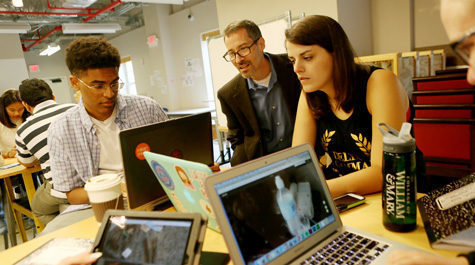Ever since my first semester at the College of William and Mary, my schedule has included at least one anomaly: natural psychology one semester, then economics, an upper-level Latin class and even introductory modern dance. I’ve loved most of these classes, but they’ve been out of my comfort zone and definitely outside of my primary academic interests.
While the COLL curriculum system certainly has its flaws, it has forced me to broaden my studies and has also introduced me to some of the best departments at the College. During my first semester, while I was taking natural psychology to fulfill the ever-dreaded Natural and Quantitative Reasoning requirement, I also stumbled upon a class simply called “Gender” to fulfill the COLL 100 seminar requirement. I knew that I was passionate about feminist and gender studies, but this class challenged the way I viewed the world, exposed me to important ideas and introduced me to some of my closest friends. While I took that class on a whim, I’ve now declared my major in gender, sexuality and women’s studies.
While the COLL curriculum system certainly has its flaws, it has forced me to broaden my studies and has also introduced me to some of the best departments at the College.
I’ve also enjoyed the way the COLL system frames required classes. As someone who is genuinely terrified of STEM, the phrase “lab science” makes me want to cry. I’ve used a calculus class from high school and psychology classes to satisfy this requirement, which means that I’ve still been exposed to science, but at my own pace. Similarly, the Arts, Letters and Values and Culture, Society and the Individual requirements offer lots of flexibility. I believe that the COLL system is better than a typical general education program because students are not limited to boring, introductory classes.
What I see as the biggest flaw of the COLL system is that it limits students’ ability to graduate early. The COLL 300 and COLL 400 requirements were not offered to the class of 2019 until this year, minus the exception of a few pilot courses. These classes come with additional requirements, too. Students in this fall’s COLL 300 courses must attend a series of evening discussions and, in many cases, write response papers about the speakers. COLL 400 classes are advertised as capstones, which seems unfair when many students are already juggling capstone experience for two majors.
However, I still believe that these upper-level COLL classes are rewarding. A few weeks ago, I attended Laxmi Narayan Tripathi’s talk and performance for my COLL 300 class, and although it felt like one more thing to cram into my schedule in the moment, I left her insightful, candid presentation feeling thankful that I had attended. This coming week, I’ll get to learn about traditional Yoruba religion and the religious landscape of contemporary Nigeria during the second of these events. While writing my next response paper will certainly be overwhelming in the midst of midterms, I am so grateful that I can learn about topics outside the realm of any class I’ve ever taken at the College. Expanding liberal arts at the College is what’s supposedly at the heart of the COLL curriculum, and I believe that through things like mandated attendance at these COLL events, this is what is happening.
While I am content with the COLL system as is, I do believe it needs some work. I hope that in the next few years, the College will truly figure out what each requirement should and will look like. When I first entered the College, COLL 400 was advertised as a requirement that should be completed outside of your major(s). Now, it is within your major, but it is not clear if your major’s capstone requirement will also fulfill the COLL 400 requirement, leaving open the possibility that next year, I’ll be working on my thesis while taking two capstone courses.
That thought is definitely scary, but for the most part, the COLL system has a lot to offer, and I’ve definitely benefitted from it. Until next year, I’m just looking forward to the next of this semester’s COLL events and whatever random class I end up in next year (as long as it’s not a lab science).
Email Sarah Smith at sesmith01@email.wm.edu.



































